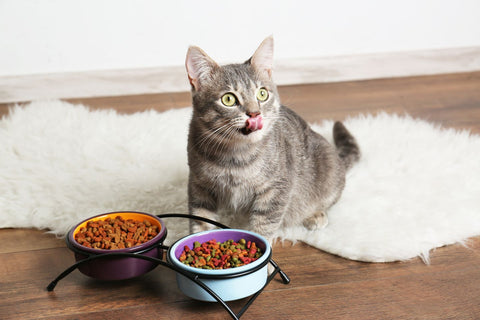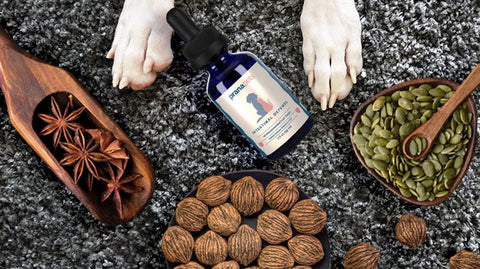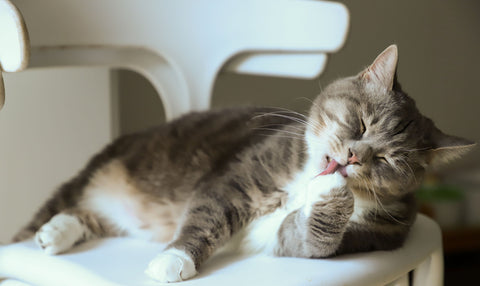

Decoding Cat Stomach Problems: Gut Biome Guide
As cat parents, we know our furry friends can be picky eaters with sometimes finicky tummies. But did you know that a healthy gut biome is crucial to your cat's overall well-being? Understanding your cat's gut biome can help you make informed decisions about their diet and health. Let’s dive into the microscopic world of your feline’s digestive system and explore why it matters.
How can you tell if your cat is having stomach issues?
Signs of cat stomach problems can include vomiting, diarrhea, constipation, bloating, lack of appetite, lethargy, and excessive grooming. If your cat shows any of these signs consistently, consult a veterinarian for proper diagnosis and treatment.
What is the Gut Biome?
The gut biome, or microbiome, is a community of microorganisms living in your cat's digestive tract. These microorganisms include:
- Bacteria: The most abundant and diverse microbes.
- Fungi: Yeasts that aid in digestion.
- Viruses: Small numbers that play roles in regulating bacteria.
- Protozoa: Single-celled organisms that help with digestion and nutrient absorption.
Why It Matters
A balanced gut biome is essential for:
- Digestive Health: Helps break down food and absorb nutrients efficiently.
- Immune Function: A significant portion of the immune system resides in the gut.
- Mood and Behavior: Gut health can influence neurotransmitter production, affecting mood and behavior.
- Overall Health: A healthy gut biome can prevent various diseases and conditions.
Signs of an Unhealthy Gut Biome
Is your kitty feeling a bit "off"? Here are some signs their gut biome might need attention:
- Digestive Issues: Diarrhea, constipation, or vomiting.
- Weight Changes: Unexplained weight loss or gain.
- Behavioral Changes: Increased stress, anxiety, or aggression.
- Skin and Coat Problems: Dull coat, excessive shedding, or skin irritations.
articlebanners1
Causes of Gut Biome Issues in Cats
Sometimes our feline friends can get an upset stomach and we don't know why. Some common causes for these issues can be diet changes, infections, antibiotics, stress, and underlying health conditions such as food intolerance, food allergies, and inflammatory bowel disease (IBD). Monitoring your cat's diet, providing probiotics, reducing stressors, and seeking veterinary advice can help maintain a healthy gut biome. Clinical signs of gut biome issues in cats may include loose stool, vomiting, and reduced appetite, especially in cases of infectious diseases. Remember, a happy tummy means a happy kitty! Understanding the types and causes of digestive disorders, including those related to the gastrointestinal tract and infectious diseases, can help you better care for your cat's gut health.
Diagnosing Gut Biome and Digestive Issues
Diagnosing gut biome and digestive issues in cats often involves a combination of physical examination, medical history review, and possibly diagnostic testing such as blood work, fecal analysis, or imaging studies. Your veterinarian may recommend specific dietary changes, probiotics, medications, or other interventions based on the underlying cause identified during the physical exam. It's essential to address these issues promptly to ensure your cat's overall health and well-being, which may include a customized plan based on the most likely conditions your pet may have.
How to Support Your Cat’s Gut Biome
Maintaining a healthy gut biome for your cat can be as simple as:
-
Balanced Diet:
- Opt for high-quality, species-appropriate food.
- Include a variety of proteins.
- Avoid fillers and artificial ingredients.
-
Probiotics and Prebiotics:
- Probiotics: Live beneficial bacteria that support gut health.
- Prebiotics: Non-digestible fibers that feed good bacteria.
-
Hydration:
- Ensure your cat has access to fresh water.
- Consider wet food to increase moisture intake.
-
Regular Vet Check-ups:
- Routine vet visits to monitor overall health.
- Discuss any digestive issues or concerns with your vet.
Treatment Options for Cat Stomach Problems
Some other treatment options for cat stomach problems are probiotic supplements, digestive enzyme supplementation, dietary fiber management, and tailored nutrition plans, including increasing their water intake. A temporary switch to a bland diet, such as a hairball control diet or a cat food with the right fiber balance, may also be recommended until the cat's symptoms subside. Always consult with your veterinarian before starting any new treatment regimen for your cat's stomach problems. Early detection and proactive management can significantly improve your cat's digestive health and quality of life. Remember, a healthy gut biome is key to a happy and thriving feline companion.
articlebanners3
Preventative Measures to Maintain a Healthy Gut Biome
As cat owners, we never want to see our sweet kitties suffer. It's always best when we can prevent these types of issues from ever starting in the first place. While this is not always possible, there are definitely somethings you can do to help keep your kitty feeling their best. One of the key aspects in ensuring your cat's overall health and well-being is by maintaining a healthy gut biome. This can be achieved through various means, such as providing a balanced diet with high-quality food, avoiding table scraps, incorporating probiotics and prebiotics, ensuring proper hydration, and scheduling regular vet check-ups to address any digestive concerns promptly.
Probiotic Supplements for Cats
Adding a probiotic supplement to your cat's diet can be an easy way to promote a healthy gut biome. Probiotics work by introducing beneficial bacteria to your cat's digestive system, aiding in digestion and overall gut health. These supplements can help restore the natural balance of microorganisms in the intestines, especially after a course of antibiotics or during times of stress. It's important to choose a probiotic specifically formulated for cats and consult with your vet regarding the proper dosage and administration for your feline friend. By incorporating probiotic supplements into your cat's routine, you are taking proactive steps towards maintaining their digestive health and well-being.
Other Herbal Supplements for Cat Stomach Problems
While prebiotics and probiotics are so important for your cat's overall gut health, there are also other natural supplements that can help. Some herbal and plant-based ingredients to look for in digestive supplements for cats are ginger, marshmallow root, and slippery elm. These ingredients can help soothe inflammation, reduce stomach upset, and promote overall digestive wellness in cats. Ginger is known for its anti-nausea properties, while marshmallow root and slippery elm are great for soothing irritated gastrointestinal linings. Other things to look for are milk thistle, buckthorn, anise, and cloves. Milk thistle has antioxidant properties that aid in liver function, while buckthorn helps with constipation and bowel regularity. Anise and cloves can help with gas and bloating issues in cats.
When choosing herbal supplements for cat stomach problems, it's essential to ensure they are safe for feline consumption and consult with a veterinarian before incorporating them into your cat's diet. By exploring a combination of probiotic and herbal supplements tailored to your cat's specific needs, you can support their digestive system and overall health effectively. Remember, always prioritize your cat's well-being by staying informed and seeking professional guidance when necessary.
When to Consult a Veterinarian for Gut Health Issues
While preventative measures are crucial, it's also important to know when to seek professional help for your feline friend's gut health issues. If you notice persistent symptoms such as vomiting, diarrhea, constipation, bloating, or changes in appetite or weight, it's time to consult a veterinarian for common symptoms of gi issues and intestinal blockages. These could be signs of underlying digestive problems that need medical attention, including abdominal pain and chronic enteropathy. Early intervention can prevent complications and ensure your cat receives the necessary treatment for optimal gut health. Remember, your vet is your best ally in keeping your cat healthy and happy.
Final Thoughts
A healthy gut biome is the foundation of your cat's overall health and happiness. By understanding the importance of a balanced gut and taking proactive steps to support it, you can help your feline friend live a longer, healthier life. Remember, a happy gut makes for a happy cat—and a happy cat parent!
For more tips and information on feline health, check out our blog and explore our range of natural supplements designed to keep your kitty in tip-top shape.
articlebanners2



